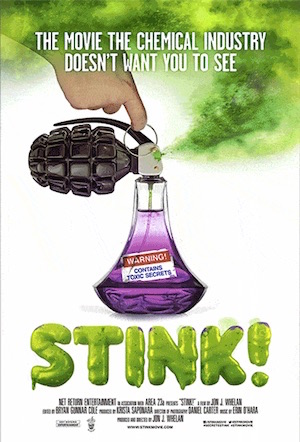Something Rotten
“This is a love story, a mystery, a crime drama, a wake-up call and a farce,” begins Jon J. Whelan’s voiceover in his new documentary Stink! Though a fairly modest enterprise, the film does manage to incorporate all those elements into a cohesive package. Stink! is essentially an eye-opening exposé of the unregulated or under-regulated use of chemicals in cosmetics, household products and clothing in the U.S. Whelan, whose own personal tragedy led him to pursue the subject, figures prominently in the film; he’s reminiscent of a low-key Morgan Spurlock or a more affable Michael Moore.
Stink!– and Whelan’s quest – starts when the widowed filmmaker orders pajamas for his young daughters from the popular tween-tailer Justice. His attempts to find out what makes the PJ’s smell bad are met with uncooperative ignorance on the part of the company, from customer service reps to its CEO; basically, chemicals used in the clothing cannot be divulged as it is “proprietary information.” That phrase soon becomes a loathsome mantra on the part of manufacturers and those representing the chemicals industry as a legal excuse to protect themselves. Whelan decides to send the offensive PJ’s to a lab for analysis…

There’s cause for concern: aside from rises in certain types of birth defects, autism and other conditions, the rate of breast cancer has increased from one in 20 women in the 1960s to one in eight, which is especially worrying to Whelan; his wife Heather died of the disease in 2009 and he is raising two daughters. Heather’s story is slowly and straightforwardly divulged via photos and home movie snippets, interspersed throughout the film along with interviews with activists and legislators fighting for transparency, and Whelan’s own attempts to engage various industry figures regarding the loophole.
He includes the story of teenage Brandon Silk, whose near-fatal allergic reaction to AXE body spray led his mother on a futile mission to identify the chemical that is so harmful to her son. (Of course the formula is “proprietary.”) Most maddening perhaps is the fact that Europe and China, among other nations, abide by the “precautionary principle” when it comes to chemicals and thus have much stricter regulations than we do. Their cheaper, sub-standard products are dumped in the U.S. market where questionable chemicals are innocent until proven guilty. (Except they often can’t be proven guilty since manufacturers don’t have to divulge all the ingredients in their formulas.) Unsurprisingly, the lab report on Whelan’s daughters’ pajamas is not good.
Throughout the movie, Whelan, a likable everyman sort, catches up with various stakeholders including Justice CEO Michael Rayden, lobbyist Steve Rosario, New Jersey Rep. Leonard Lance, whose 2012 Cosmetic Safety Amendments Act is widely endorsed by the cosmetics/personal care industry, and Calvin M. Dooley, president and CEO of the American Chemistry Council, none of whom seem willing to answer his pointed questions about chemicals used in children’s clothing or the fragrance loophole. Though Whelan admits that he’ll never know the cause of his wife’s cancer, there is no denying the fact that there has been an increase in our collective “body burden” of chemicals over the years, and that the prevailing business model favors profits over caution, or even common sense.
Stink! ends with Whelan’s oldest daughter on the phone with Aeropostale, trying to find out if flame retardant chemicals are used on the company’s clothing and eliciting the same non-answers her father has gotten throughout the film. An enlightening look at an issue that most of us are already somewhat familiar with, the film serves as a reminder to be wary of the everyday products we use. Clearly we’re the only ones really watching out for ourselves.
Stink! opens this Friday at Cinema Village in Manhattan.
—Marina Zogbi


